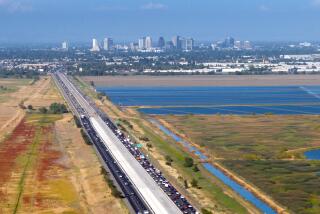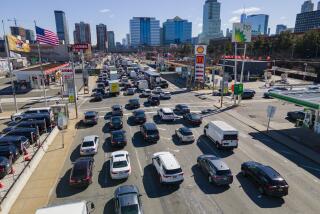For whom the tolls toll
Angelenos like their freeways to be free (although they differ on what it means for highway access to be free). That’s the sentiment expressed by the half a dozen reader responses to USC public policy professor Peter Gordon’s letter last Saturday urging motorists to be patient with Los Angeles’ experiment in congestion pricing on the 10 and 110 freeways. Gordon’s lengthy letter discussed a Times article reporting that while traffic on the 110 toll lanes has sped up since their conversion from solely carpool lanes, it has slowed on the rest of the lanes.
Gordon’s argument was that as with everything else, price must ration supply — in this case, road space. It takes time to work out the right prices for the market, he said, but when planners and motorists adjust to the new system, traffic will improve for everyone. He finished with an analogy: “How would it look at the grocery store, the movie theater or other places if access were ‘free’? My guess is that we’d all start complaining about the ‘gridlock.’”
Readers were unconvinced. Here is a selection of their letters.
—Paul Thornton, letters editor
Randall Bosley of Los Angeles defines the “free” in “freeways”:
“Gordon says it’s a shame we call our highways ‘freeways,’ since that implies free access. I call them freeways because they are free of stoplights, stop signs and cross-street traffic. And, of course, traffic has gotten worse since the carpool lanes on the 110 were converted to toll lanes.
“Not everyone can afford to pay the price. Caltrans has, in effect, defeated the very purpose of the carpool lane. Now only the rich can afford to use these lanes, while everyone else who works for a nominal living can no longer afford access.
“These are our freeways, built with our tax money. Suddenly charging us to drive in certain lanes is insane. We’ve already paid to drive in those lanes.”
Glendale resident Phillip Hain also takes issue with Gordon’s idea of free access:
“Gordon’s analogy comparing the toll lane conversion to making access to movie theaters and grocery stores ‘free’ was really poor. It’s surprising coming from someone in academia. The places he cites are destinations, not the method of transportation one must use to get there.
“And the comparison doesn’t work on another level: It holds up something people readily acknowledge as having a cost that must be paid against taking something that is free and suddenly instituting a charge.
“People already complain about the grocery store, but it’s probably for the cost of food and other items or the time spent standing in line — there is no charge to walk through the door.”
Richard P. McDonough of Irvine says L.A.’s toll lane experiment is a symptom of a societal disease:
“Gordon is a free-market (a misnomer) guy who obviously does not see the variant pricing system of public services paid for with tax dollars as the reinforcement of the increasingly evident class system in the United States.”
ALSO:
Letters: Gun politics’ strange math
Letters: Discipline in the classroom
Letters: A spotlight on the Gosnell abortion case
More to Read
A cure for the common opinion
Get thought-provoking perspectives with our weekly newsletter.
You may occasionally receive promotional content from the Los Angeles Times.










